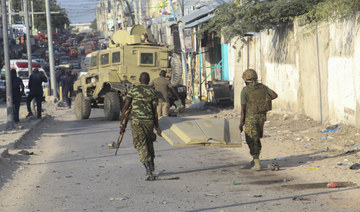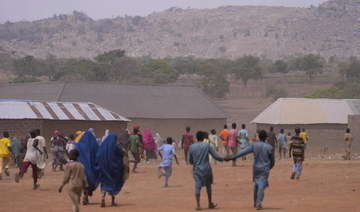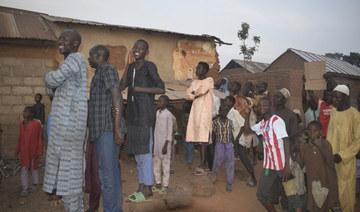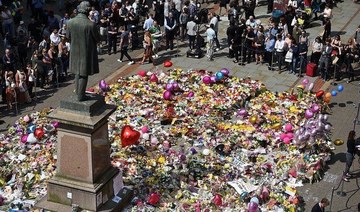NAIROBI: The United States said Monday it was increasing its reward for information about key leaders of Somalia’s Al-Shabab to $10 million apiece, a move that follows a spate of deadly attacks by the extremist group.
The US State Department also said it was for the first time offering a reward of up to $10 million for information “leading to the disruption of the financial mechanisms” of the Al-Qaeda affiliate.
Al-Shabab fighters have stepped up attacks in the Somali capital Mogadishu and other parts of the country in the face of a widescale offensive against the group by the new government of President Hassan Sheikh Mohamud.
The US said it was offering up to $10 million each for information leading to the identification of Al-Shabab “emir” Ahmed Diriye, second-in-command Mahad Karate and Jehad Mostafa, a US citizen who it said had various roles in the group.
“These key leaders of Al-Shabab are responsible for numerous terrorist attacks in Somalia, Kenya and neighboring countries that have killed thousands of people,” said a poster issued by the US with pictures of the three men.
UN human rights chief Volker Turk said earlier Monday that more than 600 civilians had been killed this year in attacks largely attributed to the group.
At least 613 civilians have been killed and 948 injured so far in 2022, according to the latest United Nations figures — the highest since 2017 and a more-than 30-percent rise from last year.
In the deadliest attack in five years, twin bombings on October 29 claimed by Al-Shabab killed at least 121 people and injured 333 others in Mogadishu, the UN said, citing Somali figures.
The group, which was designated a foreign terrorist organization by the State Department in March 2008, has been seeking to overthrow the fragile foreign-backed government in Mogadishu for about 15 years.
Its fighters were driven out of Mogadishu in 2011 by an African Union force, but the group still controls swathes of countryside and continues to wage deadly strikes on civilian, political and military targets.
In August, following a 30-hour siege on a Mogadishu hotel that killed at least 21 people, Mohamud declared “all-out war” on the extremists, who espouse a strict version of sharia or Islamic law.
The US statement said Diriye, who has been leader since September 2014 after the killing of Ahmed Abdi Godane in a US strike, was designated by the US as a “specially designated global terrorist” in April 2015, and slapped with UN sanctions the same year.
Karate, who was also designated a terrorist in April 2015 and also faces UN sanctions, continues to lead some Al-Shabab operations, the US said.
He also “maintains some command responsibility over Amniyat, the group’s intelligence and security wing, which oversees suicide attacks and assassinations in Somalia, Kenya, and other countries in the region, and provides logistics and support for Al-Shabab’s terrorist activities.”
Mostafa, a US citizen who once lived in California, has been a military instructor at Al-Shabab training camps, as well as a leader of foreign fighters, a leader in the group’s media wing, an intermediary with other “terrorist organizations,” and a leader in the use of explosives in attacks, the US said.
In December 2019, he was indicted in a US court on various charges linked to Al-Shabab.
“The FBI assesses Mostafa to be the highest-ranking terrorist with US citizenship fighting overseas.”
In May, US President Joe Biden decided to restore a military presence in Somalia, approving a request from the Pentagon, which deemed his predecessor Donald Trump’s rotation system too risky and ineffective.
US offers $10m rewards for Somalia’s Al-Shabab
https://arab.news/g4w7f
US offers $10m rewards for Somalia’s Al-Shabab
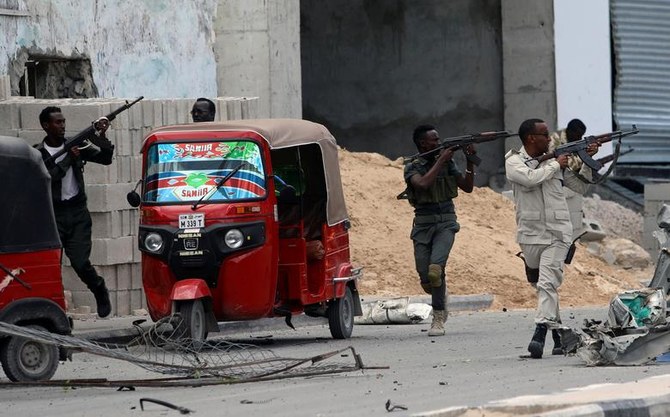
- The US is offering up to $10m each for information leading to the identification of Al-Shabab ‘emir’ Ahmed Diriye, second-in-command Mahad Karate and US citizen Jehad Mostafa
- In August, following a 30-hour siege of a Mogadishu hotel that killed at least 21 people, President Hassan Sheikh Mohamud declared ‘all-out war’ on the extremists
Nigerian troops and village vigilantes rescue kidnapped university students

- Troops aided by local vigilantes rescued the kidnap victims after a shootout with their abductors in Kogi state, says government spokesman
- Kidnapping has become elucrative criminal activity in Nigeria’s northwest, where roving have seize mostly young ones and demand ransom money from their relatives
MAIDUGURI, Nigeria: Nigerian security forces have rescued students kidnapped from a university in northern Kogi state, along with other victims held by the abductors, the army and state government said on Sunday.
Kogi information commissioner Kingsley Femi Fanwo said security forces were involved in a shootout with the armed gang that carried out Thursday’s abduction at Confluence University of Science and Technology.
The state had enlisted the help of local hunters who know the Kogi terrain, and a security agent and hunter were wounded.
The Nigerian army said in a separate statement that troops, other security agencies and local vigilantes were involved in “a fierce firefight” with the kidnappers.
“The superior firepower of the troops led to the kidnappers abandoning nine of the kidnapped students, who were subsequently rescued,” the army said.
Nigeria’s President Bola Tinubu has ruled out the payment of ransoms for the abducted schoolchildren. He instead directed security agencies to urgently rescue the children and “in the process to ensure that not a dime is paid for ransom.”
The victims were among more than 100 people kidnapped by gunmen during Friday night raids on three villages in northwest Nigeria, in the latest abduction of villagers in a region blighted by widespread insecurity.
Kidnapping has become endemic in Nigeria’s northwest as roving gangs of armed men abduct people from villages, highways and schools, and demand ransom money from their relatives.
AlHajji Bala, head of a district in the Birnin-Magaji local government area of Zamfara, said gunmen attacked the villages of Gora, Madomawa and Jambuzu and that 38 men and 67 women and children were missing.
“But the number of people abducted could be more than that,” he said.
Zamfara is a hotspot for kidnapping gangs who carry out attacks and retreat into forests where they have set up camps. The Nigerian military has bombed some of the camps but attacks continue.
Yezid Abubakar, Zamfara police spokesperson, could not immediately be reached for comment.
Aminu Aliyu Asha, the Madomawa village head, said gunmen arrived in his village on motorbikes and shot sporadically before kidnapping several people.
“The abduction breaches the peace agreement between us and bandits. In February this year, we made several ransom payments in order to stop them from attacking our territory,” said Asha.
Nusa Sani said his two brothers were among those abducted, while another resident, Garba Kira, added that among the abducted were 15 passengers in a lorry that was passing through the villages.
Mass kidnappings were first carried out by jihadist group Boko Haram when they seized more than 200 students a decade ago, but the practice has been adopted by armed gangs with no known ideological affiliation and has grown as Nigerians grapple with economic hardship.
Putin removes defense minister Shoigu

- That included when Wagner paramilitary chief Yevgeny Prigozhin launched a bloody insurrection last year calling for Shoigu’s removal
MOSCOW: Russian President Vladimir Putin on Sunday moved to replace defense minister Sergei Shoigu in a major shake-up to Russia’s military leadership more than two years into its Ukraine offensive.
Putin proposed economist Andrey Belousov as Shoigu’s replacement, according to a list of the ministerial nominations published by the Federation Council, Russia’s upper house of parliament.
The move comes at a key time in the conflict with Russian troops advancing in eastern Ukraine and having just launched a major new ground operation against the northeastern Kharkiv region.
Despite a string of military setbacks in the first year of the campaign — including the failure to capture the Ukrainian capital Kyiv and retreats from the Kharkiv and southern Kherson regions — Putin had stood by Shoigu until now.
That included when Wagner paramilitary chief Yevgeny Prigozhin launched a bloody insurrection last year calling for Shoigu’s removal.
Explaining the timing of the decision, the Kremlin on Sunday said it needed the defense ministry to stay “innovative.”
“The defense ministry must be absolutely open to innovation, to the introduction of all advanced ideas, to the creation of conditions for economic competitiveness,” state media quoted Kremlin spokesman Dmitry Peskov as saying in a briefing on the appointments.
“The battlefield is won by whoever is more open to innovation,” Peskov said.
“That is likely why the president has settled on the candidacy of Andrey Belousov,” he added.
Belousov, who has no military background, has been one of Putin’s most influential economic advisers over the last decade.
UK defense minister Grant Shapps said the Ukraine conflict had left more than 355,000 Russian soldier casualties under Shoigu’s watch as well as “mass civilian suffering.”
“Russia needs a Defense Minister who would undo that disastrous legacy” and end the conflict, “but all they’ll get is another of Putin’s puppets,” he wrote on X, formerly Twitter.
Shoigu, 68, was appointed Russian defense minister in 2012 and has had a decades-long political career of unmatched longevity in post-Soviet Russia.
His presence at the center of power in Moscow predates that of Putin himself.
Prior to Russia launching its full-scale military campaign on Ukraine in February 2022, he was seen as one of Putin’s most trusted lieutenants.
The pair were regularly photographed on macho nature retreats in the Siberian wilderness, hunting and fishing together.
In one famous snap from 2017 shared by the Kremlin, they are sitting bare-chested under the sun on a beach by a lake.
On Sunday, Putin simultaneously issued decrees naming Shoigu as the new secretary of the Security Council, replacing his longstanding ally Nikolai Patrushev.
The Kremlin also said Valery Gerasimov, the Chief of the General Staff, would stay in post overseeing daily military operations in Ukraine.
Along with Shoigu, Gerasimov had been targeted by a hardcore group of influential pro-offensive military bloggers for Moscow’s perceived military failures.
Prigozhin, who marched on Moscow calling for the pair’s removal, died in an unexplained plane crash weeks after his aborted mutiny.
Putin is constitutionally required to name a new set of government ministers — or reappoint existing ones — following his victory in a March election devoid of opposition.
Lawmakers in Russia’s rubber-stamp parliament need to approve the president’s nominations, which they are set to do over the coming days.
The future of Patrushev, an arch-hawk who is sometimes seen as a possible successor to Putin, was unclear.
There was no immediate high-level reaction to the shake-up in Ukraine.
The changes come at a crucial time in the conflict, which had been showing signs of a stalemate for months.
Putin casts the fight against Ukraine as a near-existential battle for his country, calling it just one front of a “hybrid war” between Russia and the West.
India vote to resume with Kashmir poised to oppose Modi

- Modi remains popular across much of India and his Hindu-nationalist Bharatiya Janata Party (BJP) is widely expected to win the poll when it concludes early next month
SRINAGAR, India: India’s six-week election is set to resume Monday including in Kashmir, where voters are expected to show their discontent with dramatic changes in the disputed territory under Prime Minister Narendra Modi’s government.
Modi remains popular across much of India and his Hindu-nationalist Bharatiya Janata Party (BJP) is widely expected to win the poll when it concludes early next month.
But his government’s snap decision in 2019 to bring Kashmir under direct rule by New Delhi — and the drastic security clampdown that accompanied it — have been deeply resented among the region’s residents, who will be voting for the first time since the move.
“What we’re telling voters now is that you have to make your voice heard,” said former chief minister Omar Abdullah, whose National Conference party is campaigning for the restoration of Kashmir’s former semi-autonomy.
“The point of view that we want people to send out is that what happened... is not acceptable to them,” he told AFP.
Kashmir has been divided between India and Pakistan since their independence in 1947. Both claim it in full and have fought two wars over control of the Himalayan region.
Rebel groups opposed to Indian rule have waged an insurgency since 1989 on the side of the frontier controlled by New Delhi, demanding either independence or a merger with Pakistan.
The conflict has killed tens of thousands of soldiers, rebels and civilians in the decades since, including a spate of firefights between suspected rebels and security forces in the past month.
Violence has dwindled since the Indian portion of the territory was brought under direct rule five years ago, a move that saw the mass arrest of local political leaders and a months-long telecommunications blackout to forestall expected protests.
Modi’s government says its canceling of Kashmir’s special status has brought “peace and development,” and it has consistently claimed the move was supported by Kashmiris.
But his party has not fielded any candidates in the Kashmir valley for the first time since 1996, and experts say the BJP would have been roundly defeated if it had.
“They would lose, simple as that,” political analyst and historian Sidiq Wahid told AFP last week.
The BJP has appealed to voters to instead support smaller and newly created parties that have publicly aligned with Modi’s policies.
But voters are expected to back one of two established Kashmiri political parties calling for the Modi government’s changes to be reversed.
India’s election is conducted in seven phases over six weeks to ease the immense logistical burden of staging the democratic exercise in the world’s most populous country.
More than 968 million people are eligible to vote in India’s election, with the final round of polling on June 1 and results expected three days later.
Turnout so far has declined significantly from the last national poll in 2019, according to election commission figures.
Analysts have blamed widespread expectations that Modi will easily win a third term and hotter-than-average temperatures heading into the summer.
India’s weather bureau has forecast more hot spells in May and the election commission formed a taskforce last month to review the impact of heat and humidity before each round of voting.
Civilians evacuated from northeast Ukraine as Russia steps up assault

- Heavy fighting raged on Sunday as Russia attacks 27 settlements
KYIV: Thousands more civilians have fled Russia’s renewed ground offensive in Ukraine’s northeast that has targeted towns and villages with a barrage of artillery and mortar fire, officials said Sunday.
The intense battles have forced at least one Ukrainian unit to withdraw in the Kharkiv region, capitulating more land to Russian forces across less defended settlements in the so-called contested “gray zone” along the Russian border.
Meanwhile, a 10-story apartment block collapsed in the Russian city of Belgorod, near the border, with several deaths and injuries reported. Russian authorities said the building collapsed following Ukrainian shelling. Ukraine has not commented on the incident.
HIGHLIGHT
The Russian Defense Ministry said Saturday that Moscow’s forces had captured five villages on the border of Ukraine’s Kharkiv region and Russia. Ukraine’s leadership has not confirmed Moscow’s gains.
At least 4,000 civilians have fled the Kharkiv region since Friday, when Moscow’s forces launched the operation, Gov. Oleh Syniehubov said in a social media statement. Heavy fighting raged Sunday along the northeast front line, where Russian forces attacked 27 settlements in the past 24 hours, he said.
Analysts say the Russian push is designed to exploit ammunition shortages before promised Western supplies can reach the front line. Ukrainian soldiers said the Kremlin is using the usual Russian tactic by launching a disproportionate amount of fire and infantry assaults to exhaust their troops and firepower.
It comes after Russia stepped up attacks in March targeting energy infrastructure and settlements, which analysts predicted were a concerted effort by Moscow to shape conditions for an offensive.
Ukrainian President Volodymyr Zelenskyy said that disrupting Russia’s offensive in the area was a priority, and that Kyiv’s troops were continuing counteroffensive operations in seven villages around the Kharkiv region.
“Disrupting the Russian offensive intentions is our number one task now. Whether we succeed in that task depends on every soldier, every sergeant, every officer,” Zelenskyy said.
The Russian Defense Ministry said Saturday that Moscow’s forces had captured five villages on the border of Ukraine’s Kharkiv region and Russia. These areas were likely poorly fortified due to the dynamic fighting and constant heavy shelling, easing a Russian advance.
Ukraine’s leadership has not confirmed Moscow’s gains.
Black, Asian and minority ethnic people make up nearly 70% of UK’s anti-terror detentions, data shows

- Fewer than 1 in 5 who were stopped were recorded as white
LONDON: Nearly 70 percent of people stopped at UK ports under anti-terrorism laws since 2021 were from Black, Asian and minority ethnic backgrounds, new figures released on Sunday show.
The Guardian newspaper requested police data under freedom of information laws, which also revealed fewer than one in five who were stopped were recorded as white.
Campaigners have criticized the statistics, saying they prove the UK’s anti-terrorism laws are disproportionately affecting Black and minority ethnic groups and not being used effectively enough to arrest the rise of far-right, white extremism, The Guardian reported.
Of the 8,095 people stopped at UK ports since 2021 under Schedule 7 of the Terrorism Act 2000, 5,619 (69.4 percent) were recorded as being from Black, Asian and minority ethnic backgrounds, compared with 1,585 (19.6 percent) recorded as white British, white Irish or white other stopped under the same law.
The head of public advocacy at the anti-Islamophobia group Cage International has also pressed British police to publish data on the religious background of those stopped under the Terrorism Act.
Anas Mustapha said: “This new data reaffirms what we already know about its racist and Islamophobic impact. However, despite evidence demonstrating that the majority of those stopped are Muslim and that forces record data on religion, the government has resisted calls to produce a religious breakdown of those harassed at the borders.
“Schedule 7 is one of the most intrusive and discriminatory of all police powers. We’ve supported hundreds of British holidaymakers impacted by the policy and it’s clear that the power is abused and must be repealed.”
A spokesman from the UK’s counter-terrorism police said the law was a “vital tool” in collecting evidence to support convictions of terrorists, as well as helping with intelligence-gathering in the prevention of attacks on British streets.
“The use of Schedule 7 powers regularly features in some of our most complex and high-risk investigations and prosecutions,” the spokesman said.
“We face an enduring terrorist threat from overseas, and whilst we are seeing a much greater prevalence of online activity, travel remains an element of terrorist methodology that provides us with potentially crucial opportunities to act.
“Where the powers are used, there are a range of robust safeguards and measures in place to ensure appropriate usage.”




